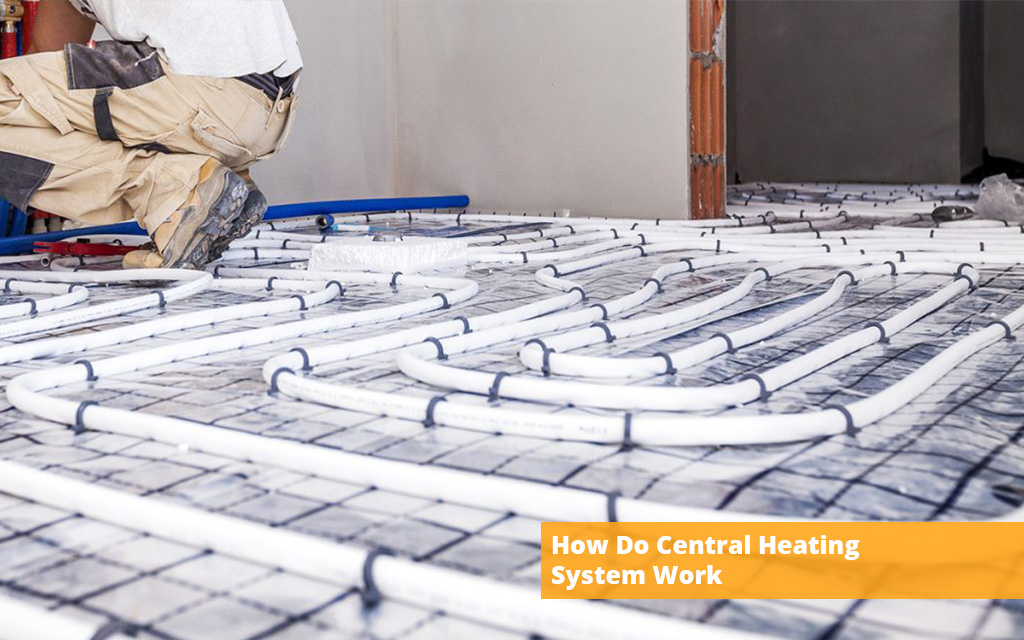Having a central heating system feels like a blessing in those chilly winter nights!
Keeping home warm and toasty is quintessential for Brits and all thanks those warming ducts that turn our home cozy and lively.
Working of central heating system depends on fuels and heat distribution patterns.
Going for a new build or home renovation? Understand how different types of central heating systems work, installation factors and cost associated with each.
What is a Central Heating System?
Central heating simply means that your home is heated from a central location.
The heating system is spread throughout your home via pipes or ducts.
A heat pump moves the heated water (or heated air) through the pipes to the central heating radiators and then, finally back to the source for reheating.
The heat circulating in your home, usually through connecting pipes (ducts) from the heating system, is adjusted via thermometers, radiator valves, or time controller, known as a Central Heating System.
How Does Your Central Heating Works?
It’s very important to understand energy to make more on energy savings.
There are primarily two types of central heating systems: Forced air systems and Radiant Systems.
Let’s have a look at what principles these systems work.
1. Forced air Systems
In a forced air central heating system, air is pushed into the system using a fan or a blower and is them heated.
This system comprises of a blower, air return & supply ductwork, heating unit with heat exchangers. All these are housed inside an air handler cabinet.
The supply ductwork carried air to the room while the return ductwork brings back the air from the rooms to the blower.
2. Radiant Systems
These system works on the principle of convection.
The heated air tends to rise up and is replaced by cooler air and so on.
These are a bit less popular than forced air system and they warm the room less quickly but are inexpensive to install, buy and maintain.
Now, let’s check three main types of central heating system that area popular in UK.
Based on above mentioned principles, get insights into how these systems actually work.
3. Furnaces
Furnaces work on the operational principles of forced-air systems to distribute the heat.
Depending on the fuel such as propane, heating oil, natural gas or electricity, furnaces are used to warm-up the homes.
The blower inside the furnace is used to push the heated air generated by burning the fuel through the ducts and reached various parts of the home.
Return ducts are used to carry the cooled air back to the furnace for reheating.
By adding a heat pump or air conditioner, the electric central heating system can offer you dual benefit by cooling your home in summers.
4. Boilers
A boiler is very energy-efficient and can use a wide range of fuels to generate heat such as natural gas, propane, electricity etc.
Pipes connected to a heating source are used to transmit heat around the home either via radiators or underfloor heating.
There are four parts to this forced-air type central heating system: a boiler, pump, pipes, and radiators.
The boiler heats up the water and a pump transports the heated water from your boiler to your radiator or underfloor heating via pipes and returns the water back to the boiler to be heated again.
5. Heat pump central heating
Heat pump central heating system actually moves the heat rather than generating them which turns them more efficient than other systems.
During winters, they work by gathering the outside heat and discharging it inside through ductwork.
The process reverses during the summer season.
There are two types of heat pumps:
- Air source heat pump: They work by gathering heat from outside and releasing inside.
- Geothermal or Ground-source: The warmth from ground is pulled and sent inside the room.
How is Central Heating Controlled?
The central heating can easily be controlled and maintained to ideal temperatures using a thermostat or radiator values.
A smart or standard thermostat helps in monitoring the room temperature and switches off the heating system when it has reached a specific set limit.
Additionally, some boilers do come with timers that help you turn off the timer after a specified limit.
Going for a mart thermostat empowers you to control your home warming from your mobile device and make it available with you 24/7.
Central Heating Installation
Your home’s central heating system plays a very vital role in keeping your family warm all the year long.
It’s imperative to have high-quality components and equipments of a central heating system but having a professional installation is equally important.
Going for professional central heating installation ensures that everything is up to specification and mitigates the risk of any system breakdown or inefficient process.
The best time to install a system is when you are building your home from scratch renovating else you may end up in costly repairs and paying high heating bills.
How Much Does Central Heating Cost?
The price of depends on a lot of factors that includes specifications, components, labor cost and sometimes transportation cost.
The cost may also include the installation of boilers, style and size of radiators, pipeworks (ductworks) or sometimes additional heating controls.
The prices greatly vary as per your choice of system as well such as furnace, boiler etc and the sophistication of controls.
TEL Constructions: Installing central heating system to your new build seamlessly
Thinking of installing a central heating system to your under construction home?
TEL Constructions are not only the pioneers in constructions but are phenomenal in providing you the best of central heating systems installations.
When it comes to quality, trust and reliability, the skilled professionals at TEL are unsurpassable in every aspect.
From standard to high-end, the exceptional services by TEL Constructions garner best customer satisfaction even after sales and leave you fully contended from every angle.
Bottom Line
It’s always a great option to plan your central heating installation while you are constructing your property or undergoing renovation.
This not only ensures a seamless integration to your space but puts your initial cost down.
So, which central heating system have you planned for your new build?
 19 December 2025
19 December 2025 19 December 2025
19 December 2025 19 December 2025
19 December 2025 19 December 2025
19 December 2025 19 December 2025
19 December 2025



mangat